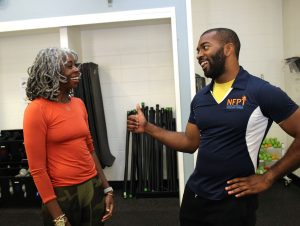
An effective Personal Trainer needs to be both a motivator and a mentor. You need to provide the right mixture of understanding and discipline.
By nature, I am very empathetic to other peoples struggles. When I started out as a Personal Trainer I discovered that was both an asset and a detriment to my success.
From a customer relation standpoint, people like to have someone that will feel empathetic and take their struggles seriously.
Yet at the same time, many people develop a comfort in knowing you can appreciate the difficulties they face. They seize this opportunity and mistake your empathy as acceptance that they are not capable of changing themselves.
People need to feel a certain level of discomfort in order to feel a need to create change.
How you interact with your clients is just as important as having fitness knowledge. If you are the foremost authority on all things fitness but are ineffective as a coach you will not be very successful at helping clients to reach their goals.
Many clients seek out a Personal Trainer because they lack discipline. They have a hard time remaining consistent with their exercise and diet regiment. They are hoping that you will give them the needed push required to keep them on track.
However, people that are just starting this new relationship with you are also often in a delicate state of emotional uncertainty. They are not feeling that sure of their abilities.
The last thing a person that is already feeling uncertain needs is to deal with a lot of negative feedback. Its a delicate balance of being an empathetic mentor and a hard-nosed motivator.
To successfully be both a motivator and mentor can be tricky but following these 4 steps can help you to succeed.
1. Always provide positive feedback with constructive criticism. If you start your conversation by providing positive feedback you set the emotional tone on a positive note. This has to be followed by a gentle transition into the constructive criticism.
If you say something like “these are some areas that I would like to help you improve” it sounds much nicer than “these are some things that you are doing wrong”.
2. Keep your client focused on the positive things they have achieved. In any relationship whether its romantic, friendship or professional the best way to maintain the relationship is by creating positive feelings.
When you build a person up you develop a good relationship. The main focus of your conversations should always be centered around all of the things your client has achieved.
3. Offer areas to be improved as things that will improve with work. Your client came to you because they want to reach a goal. If you don’t offer any areas that need improving then you are selling them short.
The best way to offer constructive criticism and keep it positive is to frame it as being things that will improve with work. This focuses on achieving the goal but also highlights that it will require hard work.
4. Don’t place blame but focus on behaviors. Nobody likes to be at fault. When you shame or ridicule a person they will instantly become defensive. You want to focus on the bad behavior rather than on the person that acted badly.
For example, rather than saying something like “you will never lose the weight if you keep on eating junk food” you can say something like “french fries and bacon cheeseburgers are pretty high in calories. Eating foods that have more nutrition and fewer calories will definitely help you lose weight”.
Notice that rather than assigning blame I focused only on the consequences of the choice. People know who is to blame. They don’t need you to remind them. When you focus on the behavior you are still holding them accountable and yet are not making them feel like they are a bad person for making a poor choice.
When I first started out I had a difficult time balancing between being a good motivator and being a good mentor. It took some trial and error to find the right mixture of sensitivity and discipline. Once I developed better coaching skills I was able to offer my clients more successful in attaining their goals.
Can you think of some ways to be both empathetic and motivational?
[info type=”facebook”]Join the Facebook Community Group to share your thoughts with other trainers.[/info]
John Rutnik is a NFPT Certified Personal Trainer. He holds an AAS in Electrical Technology and has been a certified personal trainer since 2008. John has been involved in physical fitness and weight training since the late 70’s and is an avid outdoors man. He became a personal trainer after rehabilitating himself from a spinal injury he sustained in a car accident and losing 70 pounds. John later obtained ISSA Certifications as both a Fitness Trainer and Specialist in Sports Nutrition and became Lead Fitness Trainer at Anytime Fitness in Schenectady NY. His training philosophy is “no man left behind,” everyone deserves a chance to succeed.

